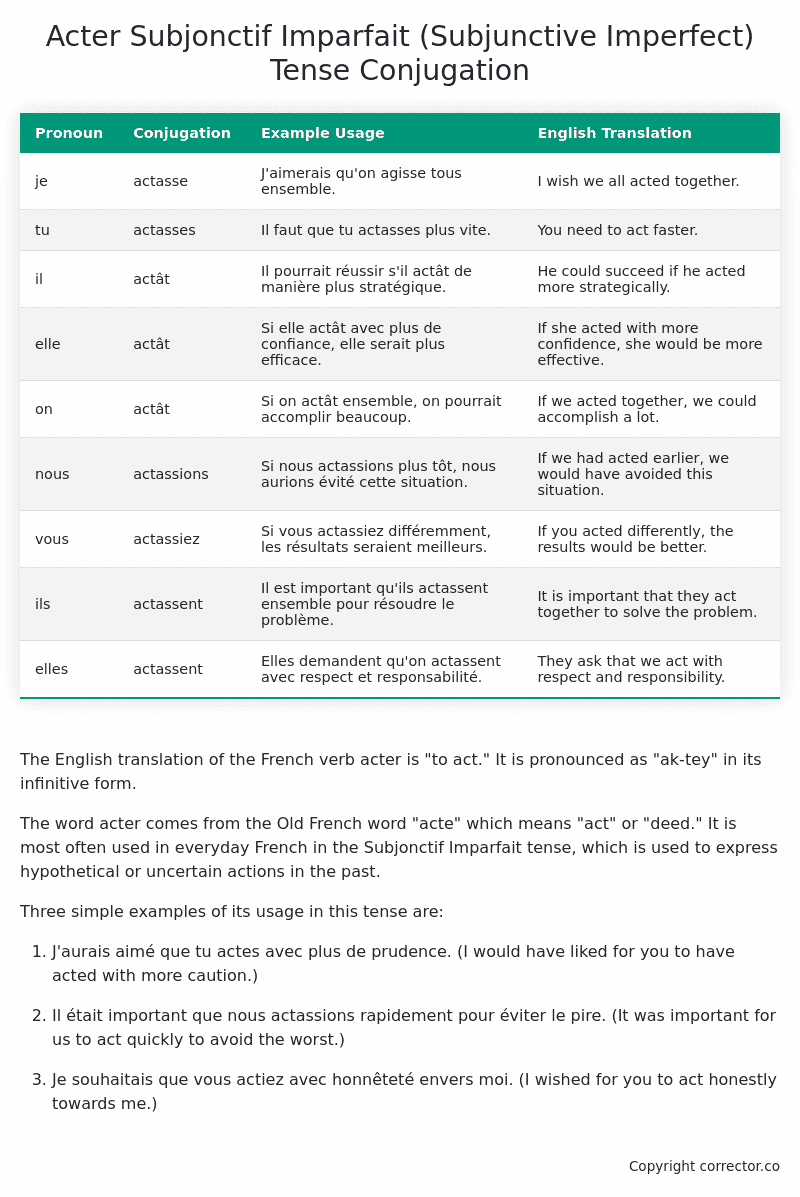Subjonctif Imparfait (Subjunctive Imperfect) Tense Conjugation of the French Verb acter
Introduction to the verb acter
The English translation of the French verb acter is “to act.” It is pronounced as “ak-tey” in its infinitive form.
The word acter comes from the Old French word “acte” which means “act” or “deed.” It is most often used in everyday French in the Subjonctif Imparfait tense, which is used to express hypothetical or uncertain actions in the past.
Three simple examples of its usage in this tense are:
-
J’aurais aimé que tu actes avec plus de prudence. (I would have liked for you to have acted with more caution.)
-
Il était important que nous actassions rapidement pour éviter le pire. (It was important for us to act quickly to avoid the worst.)
-
Je souhaitais que vous actiez avec honnêteté envers moi. (I wished for you to act honestly towards me.)
Table of the Subjonctif Imparfait (Subjunctive Imperfect) Tense Conjugation of acter
| Pronoun | Conjugation | Example Usage | English Translation |
|---|---|---|---|
| je | actasse | J’aimerais qu’on agisse tous ensemble. | I wish we all acted together. |
| tu | actasses | Il faut que tu actasses plus vite. | You need to act faster. |
| il | actât | Il pourrait réussir s’il actât de manière plus stratégique. | He could succeed if he acted more strategically. |
| elle | actât | Si elle actât avec plus de confiance, elle serait plus efficace. | If she acted with more confidence, she would be more effective. |
| on | actât | Si on actât ensemble, on pourrait accomplir beaucoup. | If we acted together, we could accomplish a lot. |
| nous | actassions | Si nous actassions plus tôt, nous aurions évité cette situation. | If we had acted earlier, we would have avoided this situation. |
| vous | actassiez | Si vous actassiez différemment, les résultats seraient meilleurs. | If you acted differently, the results would be better. |
| ils | actassent | Il est important qu’ils actassent ensemble pour résoudre le problème. | It is important that they act together to solve the problem. |
| elles | actassent | Elles demandent qu’on actassent avec respect et responsabilité. | They ask that we act with respect and responsibility. |
Other Conjugations for Acter.
Le Present (Present Tense) Conjugation of the French Verb acter
Imparfait (Imperfect) Tense Conjugation of the French Verb acter
Passé Simple (Simple Past) Tense Conjugation of the French Verb acter
Passé Composé (Present Perfect) Tense Conjugation of the French Verb acter
Futur Simple (Simple Future) Tense Conjugation of the French Verb acter
Futur Proche (Near Future) Tense Conjugation of the French Verb acter
Plus-que-parfait (Pluperfect) Tense Conjugation of the French Verb acter
Passé Antérieur (Past Anterior) Tense Conjugation of the French Verb acter
Futur Antérieur (Future Anterior) Tense Conjugation of the French Verb acter
Subjonctif Présent (Subjunctive Present) Tense Conjugation of the French Verb acter
Subjonctif Passé (Subjunctive Past) Tense Conjugation of the French Verb acter
Subjonctif Imparfait (Subjunctive Imperfect) Tense Conjugation of the French Verb acter (this article)
Subjonctif Plus-que-parfait (Subjunctive Pluperfect) Tense Conjugation of the French Verb acter
Conditionnel Présent (Conditional Present) Tense Conjugation of the French Verb acter
Conditionnel Passé (Conditional Past) Tense Conjugation of the French Verb acter
L’impératif Présent (Imperative Present) Tense Conjugation of the French Verb acter
L’infinitif Présent (Infinitive Present) Tense Conjugation of the French Verb acter
Struggling with French verbs or the language in general? Why not use our free French Grammar Checker – no registration required!
Get a FREE Download Study Sheet of this Conjugation 🔥
Simply right click the image below, click “save image” and get your free reference for the acter Subjonctif Imparfait tense conjugation!

Acter – About the French Subjonctif Imparfait (Subjunctive Imperfect) Tense
Formation
Common Everyday Usage Patterns
Interactions with Other Tenses
Subjonctif Présent
Indicatif Passé Composé
Conditional
Conditional Perfect
Summary
I hope you enjoyed this article on the verb acter. Still in a learning mood? Check out another TOTALLY random French verb conjugation!


